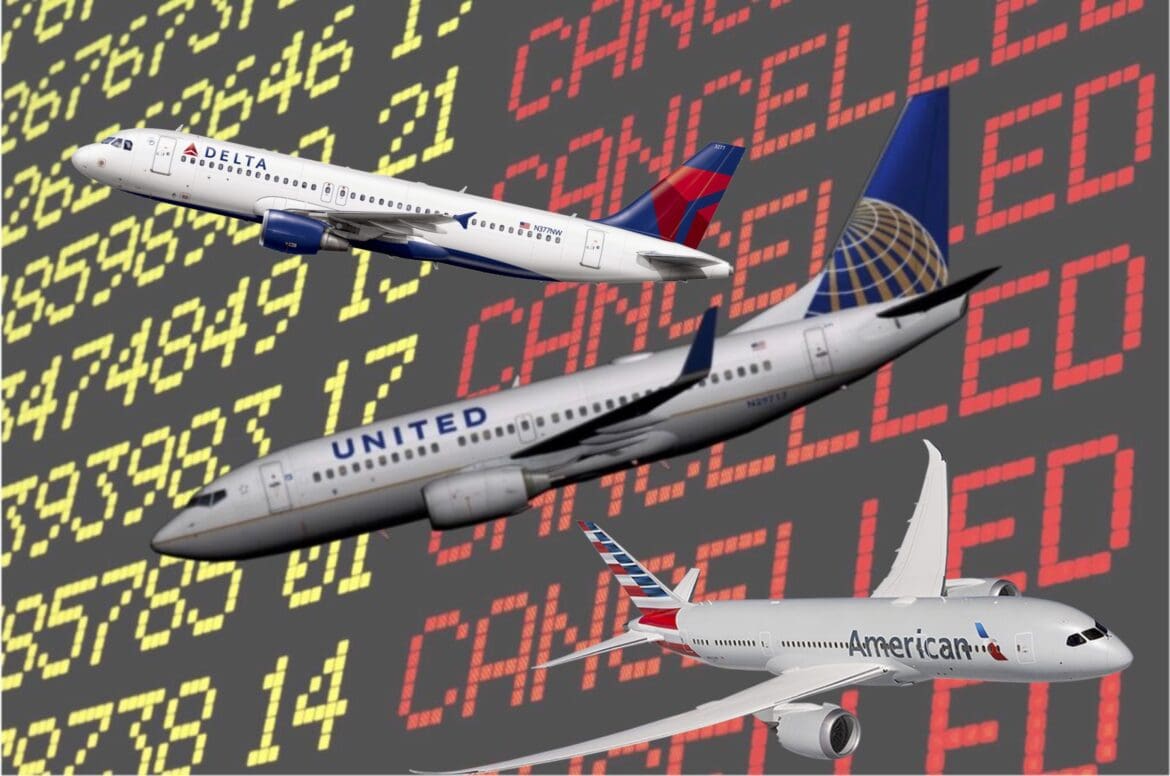Advertiser & Editorial Disclosure: The Bulkhead Seat earns an affiliate commission for anyone approved through the links below. This compensation may impact how and where links appear on this site. We work to provide the best publicly available offers to our readers. We frequently update them, but this site does not include all available offers. Opinions, reviews, analyses & recommendations are the author’s alone, and have not been reviewed, endorsed, or approved by any of these entities.
The Federal Aviation Administration (FAA) has warned that thousands of flights across the United States could be canceled if the ongoing government shutdown continues through this Friday, November 7th. The shutdown, now entering its second month since beginning on October 1st, is the longest in US history and is beginning to cause disruptions across the aviation system.
Federal agencies are under mounting strain as operations continue without funding. The Department of Transportation (DOT) confirmed that flight reductions at some of the nation’s busiest airports will begin this week to ease pressure on an already stretched air traffic control system. Many control towers are operating with minimal staffing (as thousands of controllers and technicians remain on duty without pay).
While air traffic controllers and Transportation Security Administration (TSA) agents are classified as essential personnel and required to work during the shutdown, fatigue and financial stress have taken their toll. Increasing numbers of controllers and TSA officers have called out sick. This has forced temporary rerouting and extended delays across major airports.
The FAA manages approximately 45,000 flights per day nationwide. With planned reductions of up to 10%, more than 4,000 flights could be canceled daily if the shutdown continues into next week. According to early reports, the FAA will begin a phased reduction, cutting flight capacity by 4% on Friday, 5% on Saturday, 6% on Sunday, and reaching the full 10% threshold by midweek.
The FAA has identified 40 major domestic airports that will see schedule reductions starting this weekend, including:
- Ted Stevens Anchorage International Airport (ANC)
- Hartsfield-Jackson Atlanta International Airport (ATL)
- Baltimore/Washington International Thurgood Marshall Airport (BWI)
- Boston Logan International Airport (BOS)
- Charlotte Douglas International Airport (CLT)
- Chicago Midway International Airport (MDW)
- Chicago O’Hare International Airport (ORD)
- Cincinnati/Northern Kentucky International Airport (CVG)
- Dallas Fort Worth International Airport (DFW)
- Ontario International Airport (DAL)
- Denver International Airport (DEN)
- Detroit Metropolitan Wayne County Airport (DTW)
- Fort Lauderdale-Hollywood International Airport (FLL)
- Honolulu’s Daniel K. Inouye International Airport (HNL)
- Houston’s George Bush Intercontinental Airport (IAH)
- Houston’s William P. Hobby Airport (HOU)
- Indianapolis International Airport (IND)
- Las Vegas Harry Reid International Airport (LAS)
- Los Angeles International Airport (LAX)
- Louisville Muhammad Ali International Airport (SDF)
- Memphis International Airport (MEM)
- Miami International Airport (MIA)
- Minneapolis-Saint Paul International Airport (MSP)
- Newark Liberty International Airport (EWR)
- New York John F Kennedy International Airport (JFK)
- New York LaGuardia Airport (LGA)
- Oakland San Francisco Bay Airport (OAK)
- Ontario International Airport (ONT)
- Orlando International Airport (MCO)
- Philadelphia International Airport (PHL)
- Phoenix Sky Harbor International Airport (PHX)
- Portland International Airport (PDX)
- Salt Lake City International Airport (SLC)
- San Diego International Airport (SAN)
- San Francisco International Airport (SFO)
- Seattle-Tacoma International Airport (SEA)
- Tampa International Airport (TPA)
- Teterboro Airport (TEB)
- Ronald Reagan Washington National Airport (DCA)
- Washington Dulles International Airport (IAD)
These airports represent a significant portion of the nation’s domestic air traffic and even modest reductions could lead to ripple effects across the global aviation network.
The timing of these reductions could not be worse. With Thanksgiving travel just weeks away, millions of travelers are likely to face longer security lines, flight delays, and cancellations. Airlines have already begun preparing for potential disruptions, with several carriers reducing flight schedules and waiving change fees for affected customers. United Airlines issued a note to employees and customers last night explaining what it plans to do over the next week.
Until the government passes a new funding bill, travelers are being urged to take precautions:
- Monitor flight alerts from your airline via email, apps, or text notifications.
- Arrive early at the airport to allow extra time for longer lines.
- Take flights earlier in the day to add time for delays.
- Use TSA PreCheck® or CLEAR to speed up security screening when possible.
- Consider flexible travel options such as rebooking or using loyalty points for alternate flights.
- Explore alternate transportation, including trains, buses, or car rentals, if flights are canceled.
- Know your rights under Department of Transportation (DOT) refund policies if your flight is canceled or significantly delayed.
Anthony’s Take: I’m writing this from a plane and I have flights tomorrow, Tuesday, Wednesday, Thursday, and Friday next week. I fear what my days will look like if the shutdown is not resolved soon. For passengers across the country, the coming weeks could see the most significant disruption to US air travel in decades.
User Generated Content Disclosure: The Bulkhead Seat encourages constructive discussions, comments, and questions. Responses are not provided by or commissioned by any bank advertisers. These responses have not been reviewed, approved, or endorsed by the bank advertiser. It is not the responsibility of the bank advertiser to respond to comments.
Advertiser & Editorial Disclosure: The Bulkhead Seat earns an affiliate commission for anyone approved through the links above This compensation may impact how and where links appear on this site. We work to provide the best publicly available offers to our readers. We frequently update them, but this site does not include all available offers. Opinions, reviews, analyses & recommendations are the author’s alone, and have not been reviewed, endorsed, or approved by any of these entities.
